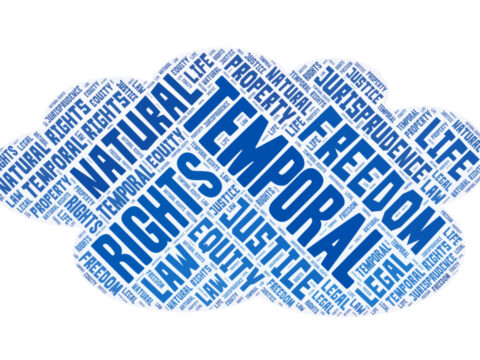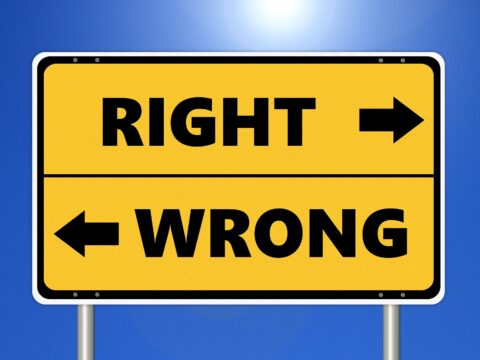It’s simple: start with the topic you’re discussing and connect it to human rights. All politics and all conflict is about rights, so move the discussion to this most fundamental issue. Once you get onto the rights topic, you can powerfully show the difference between good and bad politics. Under the light of rights, you can win every political discussion.
But You Could Still Be Wrong
But you can’t help anyone if you don’t first love them. If your goal in the political discussion is to prove they are wrong, then you are wrong and your efforts are in vain. You can’t win by intimidation, brow beating, or “proving” anything. You win by loving and leading. Lead your friend into liberty meadow where the twins named “rights” and “choice” dance the freedom waltz together. Once they see them dancing they may want to join in.
You must respect their right to disagree, to hold an opposite opinion, to argue with you, to vote against you, and to try to thwart your agenda. By showing them the respect you want for your opinions, you set the tone. If that tone cannot be set, then you are most likely wasting your time and theirs.
The Keys to Success
To win the discussion for the conservation of rights, you must agree on two differences: the difference between good and evil, and the difference between rights and entitlements. Don’t let that scare you. These are both simple when seen through the rights lens. Yes, that’s correct. Watch this –
Good and Evil
This is the most basic part of our personal value systems. Good and evil are the standards by which we all decide what we are for and what we are against. You can educate your friend like this, for example:
“Let’s talk about what is good politics and what is bad politics; good laws and bad laws. I think any political action that honors and protects human rights is good. So anything that violates the basic human rights of choice, speech, movement, and ownership are bad. What do you think?”
This should get agreement. Help them see that every issue, every political conflict, whether between people or nations, is fundamentally about rights. You may need to ponder this concept yourself and as you do, you will see that this is actually pretty simple – if you just stay with these most basic principles.
Be on the lookout for today’s infatuation with entitlements; you are most likely to hear entitlements treated exactly like rights. “Everyone has a right to a decent wage,” or “… to health care” are common. However, there is a clear distinction between rights and entitlements that leads to a better understanding of both.
Rights and Entitlements
The muddling of these two garbles everything political nowadays. But the problem evaporates when you compare them. A right is something inherent and intrinsic that is simply the personal authority to do what one can do. I can, and therefore I have a right to believe, think, speak, and act anyway I choose as long as I don’t violate anyone else’s rights. That’s the definition of free civilization. And here’s the key: the exercise of these rights does not infringe the rights of anyone else. When I use my rights while not violating others’ does not require anything of them, not their time, their money, or anything at all.

An entitlement, on the other hand, requires some action or some restriction of action on other people. As such, it infringes their rights because it demands something of them: usually their money. An entitlement is sometimes called a “claim right” because it makes a claim on other people; makes them partly responsible for the realization of the entitlement. To be entitled to a decent wage or healthcare is to claim that other people must help. It always contains some form of “You are responsible for my happiness.” You should notice that this attitude is the unspoken theme of the “woke” culture.
Give a single toy to two children and watch what happens when there is no understanding of the difference between rights and entitlements. That’s where we are today in America.
This topic, rights and entitlements, is a good one because it sets rights and entitlements opposite one another and that makes their differences stand out. That’s important in today’s politics, partly because socialism is entitlements run amok.
That’s it! Your outline is pretty simple. Connect the discussion to rights, get agreement on good and bad and on rights and entitlements and boom, you have another citizen who is able to think clearly about the current confusion.
Rules for Success
- Love them. Look them in the eye and respect their humanity and their rights. Keep your motives pure and simple. The highest human right is the right to choose and the highest choice is to love.
- Lead the discussion into the two fundamental issues: the difference between political good and evil, and the difference between rights and entitlements.
- Keep it simple. Don’t get pulled away from the basics until you have agreement or see that it’s hopeless for the time being. If that happens, you must resist the temptation to have the last word on the subject. Be kind, respectful, logical and calm. Even if they can’t see even a tiny bit of what you are saying, your demeanor will let them reconsider it after you’ve gone. In today’s adversarial climate, your calm attitude may well puzzle them and that’s a good thing. It’s pretty easy if you keep your “heart light on”.
- Having established the basics, go back to the original topic and apply those basics to it.
- Love them. Be patient, give them time to think, ponder, and digest. If you pressure them you are abusing their right to freedom of thought – which, next to life itself, is perhaps the most fundamental of all.
- If your happiness depends on their agreement, then you are confusing rights and entitlements.
- Help them see that #rightsMatter.




